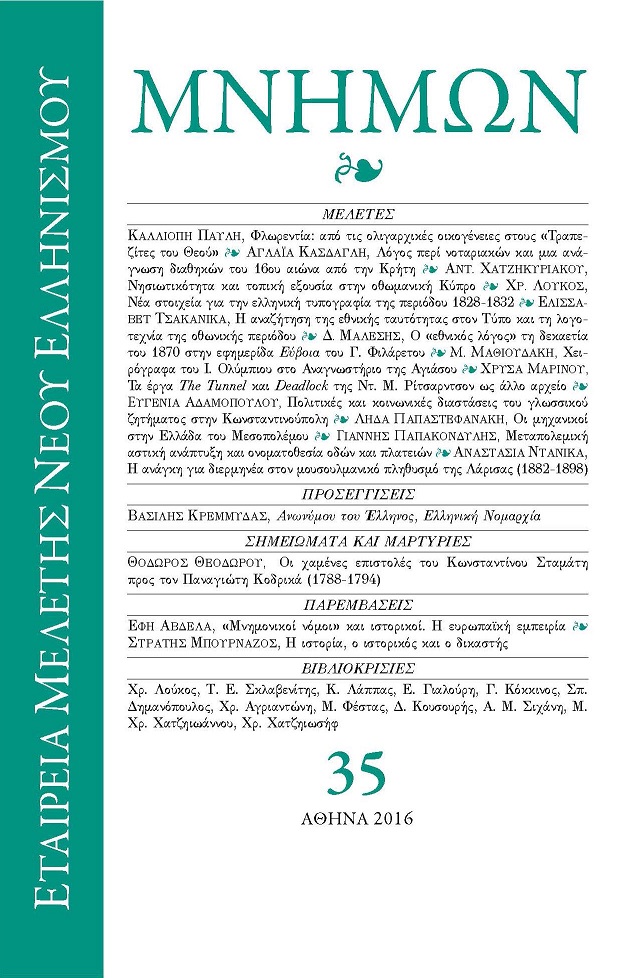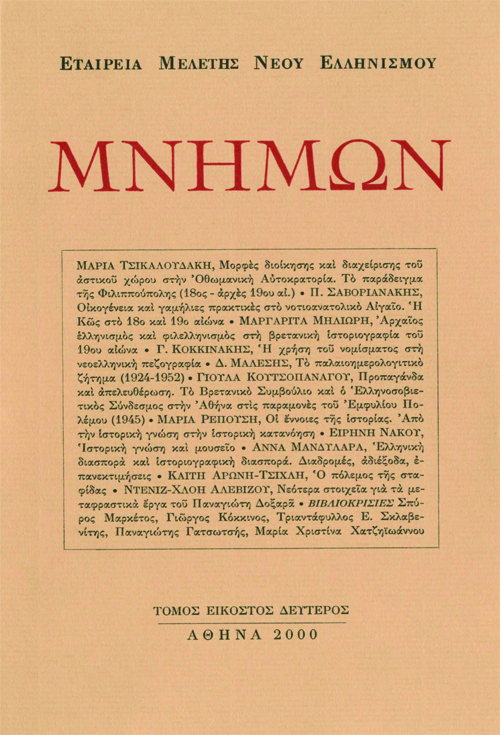“Either at the Borders or in Athens”: the “nationalist rhetoric” during the decade of 1870 in George Filaretos newspaper “Evia”

Abstract
The purpose of this study is to examine the '’nationalist talking’’, as it appeared in the articles of a provincial newspaper, “Evia”, during the latest part of the 1870 decade. Although the newspaper was a provi ncial one, meaning it had little impact, the young publisher George Fila retos would follow an important career in Greek politics during the forthcoming decades, with a very important speech and impact. The edi tion of the newspaper from 1876 to 1881, coincided with the natio nalist rising in the Balkan and the War among Russians and Turks in 1877. Filaretos would progressively support that for Greece was an oppo rtu nity to take part in a war against the Ottoman Empire so that to fulfill the irredentist policy. The hesitation of the Greek government in this subject would give the editor the opportunity to attack not only the country’s entire political leaders but also King George. Αt the same time, the irredentist environment which existed in Greece, people pro war demonstrations and the activities of various national organizations, such as the “Adelfotis”(:«Brotherhood”), would provoke uprisings in parts of the Ottoman Empire where Hellenes lived. An unprepared in a military sense and diplomatically isolated Greece had entered into a dange rous national adventure. Filaretos being a volunteer himself in a failed military adventure in Thessaly besides the “invalid” political leaders and the throne would also accuse the English and Russian policy towards his position on the issues of the Balkans. By studying “Evia” the reader finds that national issues dominate the political scene. The newspaper’s nationalist talking, sometimes sharp, sometimes laudatory usually denunciatory, is consistent with the do mi nant spirit of a romantic irredentism that aroused nationwide dur ing the last quarter of the 19th century. Through its shortlived circulation someone can see Filaretos’ political shifts, mainly a result of national developments, while notices how his antiroyalist notions were established, which made him one of the most prominent opponents of the Greek dynasty during the following decades.
Article Details
- How to Cite
-
ΜΑΛΕΣΗΣ Δ. (2019). “Either at the Borders or in Athens”: the “nationalist rhetoric” during the decade of 1870 in George Filaretos newspaper “Evia”. Mnimon, 35(35), 141–167. https://doi.org/10.12681/mnimon.20254
- Issue
- Vol. 35 (2016): Μνήμων
- Section
- ARTICLES

This work is licensed under a Creative Commons Attribution-NonCommercial-ShareAlike 4.0 International License.
The copyright for articles in this journal is retained by the author(s), with first publication rights granted to the journal. By virtue of their appearance in this open access journal, articles are free to use (with the exception of the non-granted right to make derivative works) with proper attribution for non-commercial uses (licence Creative Commons 4.0). EKT/NHRF retains the worldwide right to reproduce, display, distribute, and use articles published in Mnimon in all formats and media, either separately or as part of collective works for the full term of copyright. This includes but is not limited to the right to publish articles in an issue of the Journal, copy and distribute individual reprints of the articles, authorize reproduction of articles in their entirety in another EKT/NHRF publication, and authorize reproduction and distribution of articles or abstracts thereof by means of computerized retrieval systems.Downloads
Download data is not yet available.



